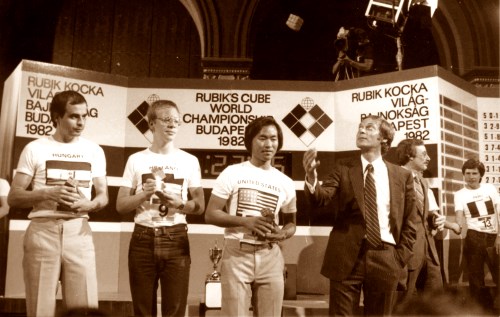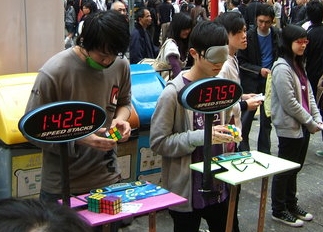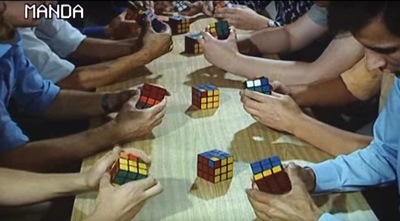Rubik's Cube Competitions
Speedcubing is about solving a Rubik's Cube or other twisty puzzle in the shortest time possible. There are numerous speedcubing competitions that take place around the World with different types of challenges like the fewest move challenge or solving the cube blindfolded, one handed, with one's feet, or underwater in a single breath. In "Team Blindfold" one team member is blindfolded and the other one is telling what moves to make.

The first Rubiks' Cube competition was held in Budapest in 1982.
The inventor Ernő Rubik throwing his cube in the air.
 The Guinness Book of World Records organized the first competition in Munich on March 13, 1981 where Jury Froeschl set the record with a time of 38 seconds. The first international World Championship was held in Budapest on June 5, 1982, and was won by Minh Thai, a Vietnamese student from Los Angeles, with a time of 22.95 seconds. Since 2003, the winner of a competition is determined by taking the average time of the middle three of five attempts. However, the single best time of all tries is also recorded. The World Cube Association maintains a history of World records. In 2004, the WCA made it mandatory to use a special timing device called Stackmat timer and they scramble the puzzles with algorithms generated by a program. In addition to official competitions, informal alternative competitions have been held which invite participants to solve the Cube in unusual situations like mentioned before.
The Guinness Book of World Records organized the first competition in Munich on March 13, 1981 where Jury Froeschl set the record with a time of 38 seconds. The first international World Championship was held in Budapest on June 5, 1982, and was won by Minh Thai, a Vietnamese student from Los Angeles, with a time of 22.95 seconds. Since 2003, the winner of a competition is determined by taking the average time of the middle three of five attempts. However, the single best time of all tries is also recorded. The World Cube Association maintains a history of World records. In 2004, the WCA made it mandatory to use a special timing device called Stackmat timer and they scramble the puzzles with algorithms generated by a program. In addition to official competitions, informal alternative competitions have been held which invite participants to solve the Cube in unusual situations like mentioned before.
The World Cube Association
The World Cube Association (WCA) governs Rubik's Cube Competitions, and for all puzzles labeled as Rubik puzzles, and all other puzzles that are played by twisting the faces (twisty puzzles). The goal of the World Cube Association is to have more competitions in more countries with more people and more fun, under fair conditions. The spirit of the World Cube Association is that people from all over the World have fun together in a friendly atmosphere, to help each other and behave sportsmanlike.
Official WCA events
- Rubik's Cube
- 2x2 Cube
- 4x4 Cube
- 5x5 Cube
- 3x3 blindfolded
- 3x3 one-handed
- 3x3 fewest moves
- 3x3 with feet
- Megaminx
- Pyraminx
- Square-1
- Rubik's Clock
- Skewb
- Big Cubes
- 7x7 Cube
- 4x4 blindfolded
- 5x5 blindfolded
- 3x3 multi blind
- Magic and Master Magic
The WCA Process
Competitions are structured almost exactly the same worldwide. A schedule is put together stating when each event will take place and how long it is expected to last. Competitors are split into groups (these can be based on your initials, time of registration, randomly, or in later rounds, your speed), and they are called up to solve once the cube they have given to be scrambled is ready. Everyone receives the same computer generated scrambles within their group. The full competition structure can be viewed on the Regulations Page.
Once you finish the competition, the results that the delegates have collected are sent to the WCA. Here they are checked over to confirm nothing is entered incorrectly and then they are published. Once your results are confirmed, your profile will be updated with your results. If you are about to attend your first competition, here is an easy way to check what your ID will be – The current year will be the start of your ID. This will be followed by the first four letters of your surname (if your surname is less than four letters long, the remaining characters will be filled with the first few letters of your first name. Finally there will be a 2 digit number which indicates how many people with the same four starting letters of their surname have registered before you. You can check what this will be by searching on the WCA website for the ID “2015****” (substituting what would be the letters in your ID in), and your ID will be the next number in the sequence. For example, my WCA ID is 2013MORR03. This means my first competition was in 2013, my surname (Morris) starts with the letters MORR, and I was the third ‘MORR’ to register in 2013.
This profile will display your best single and average for each event you have competed in. It will also display your National, Continental and World Ranking. The person with the fastest single/average from any event within your country is said to hold the National Record for that event. This is the same with Continental (although it is more common to say which continent, for example ER = European Record, OcR = Oceanian Record etc.) and with World Records.
If you would like to learn more about getting involved or just speedcubing in general, check out www.speedsolving.com and their speedcubing Wiki.
